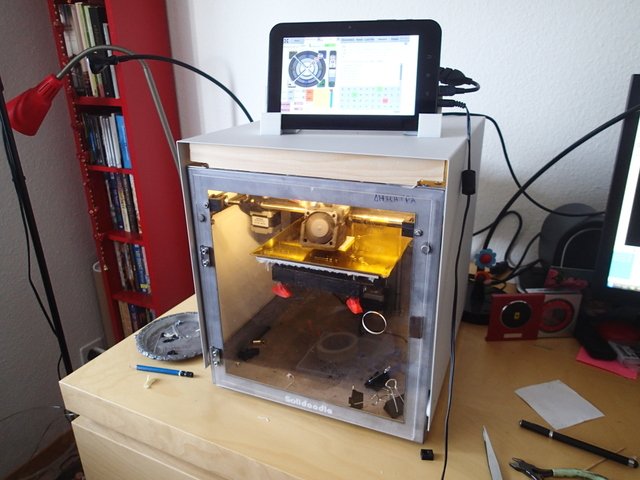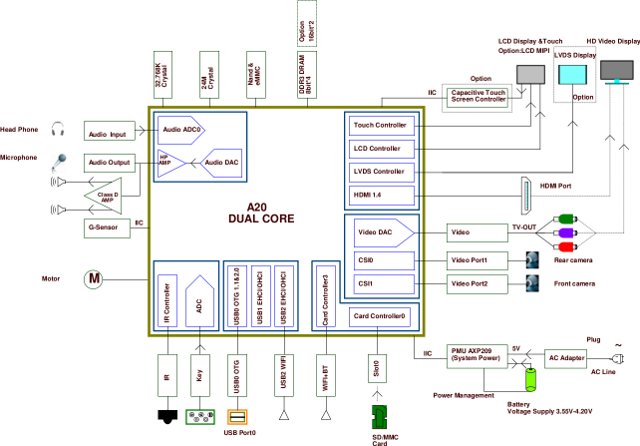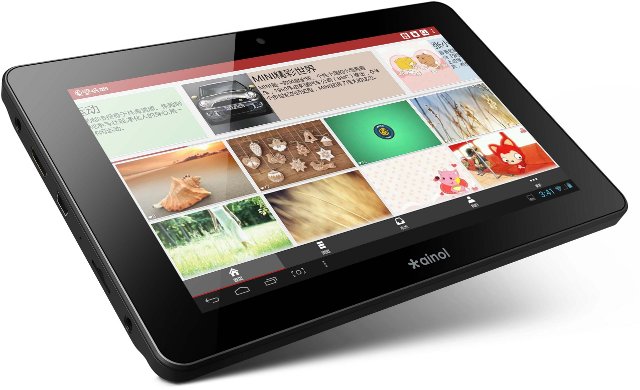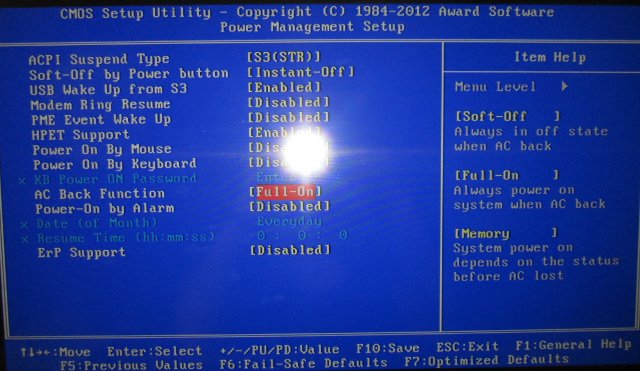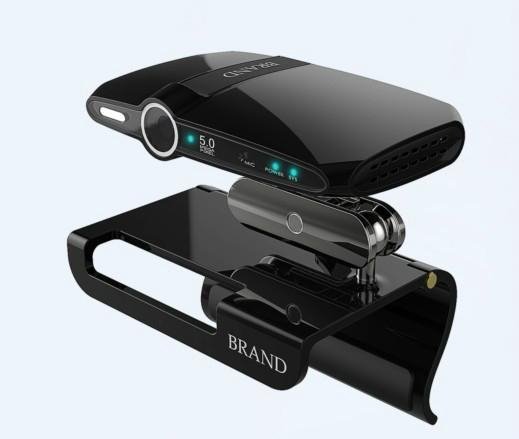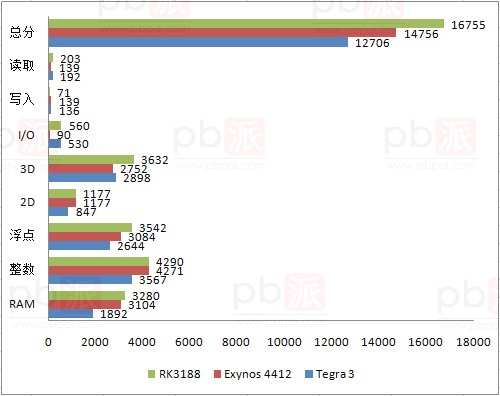PengPod 700 & 1000 are two of the rare Linux tablets to be available on the market. Those tablets are based on AllWinner A10 SoC which can support both Android and Linux thanks to independent developers. After a successful Indiegogo campaign, where they managed to received pledges for a few hundred units of both model, people started to receive their Linux tablets earlier this year. Francesco Santini decided to purchase PengPod 700 in order to use it as an touchscreen controller for his 3D printer (Solidoodle). He modified Pronterface, a graphical user interface written in Python to control 3D printer, for the 7″ display the of PengPod tablet, and made the change available in his github account https://github.com/fsantini/Printrun-pengpod700. He uses a SAMBA share to copy G-code files (“G-code is the common name for the most widely used numerical control (NC) programming language”), and load the required file from the PengPod […]
AllWinner A20 Linux Source Code, EVB Schematics and Product Brief
Hardware based on AllWinner A20 such as Cloudsto Media PC PRO DRIVEDOCK, should start to be available soon, and resources for developers have been slowly released (or leaked) to the community. AllWinner A20 Source Code The source code for AllWinner A20 and A31 has been released to sunxi-linux a while back, and they have started to clean up the code before hardware becomes available. The code apparently hasn’t made it to sunxi-linux github account just yet, but Linux for A20 has been imported into github at https://github.com/amery/linux-allwinner/tree/import/lichee-3.3/a20-dev. AllWinner A20 is known as sun7i in the code. AllWinner A20 Evaluation Board Schematics and Product Brief Olimex received A20 EVB schematics and product brief from AllWinner earlier this week, and as usual, they promptly uploaded those documents to their github account. The 3-page product brief does not bring anything new, and the data sheet does not seem to be available right now. […]
Ainol NOVO 7 Crystal II Quad Core 7″ Tablet is Available for $99
Earlier this year, several blogs and news website reported about Cherry Mobile, a 7″ Android tablet powered by Actions Semiconductor ATM7029 quad core Cortex A9 processor, that sells for just $99 in the Philippines. This morning I’ve found a quad core tablet with similar specifications that also sells for $99 on Asiapads (after using AINOLCII coupon) . The Ainol NOVO 7 Crystal II comes with a 7″ touchscreen, is powered by ATM7029 SoC with 1GB RAM and, 8GB NAND Flash. Tablet Specifications: SoC – Actions Semi ATM7029 Quad Core Cortex A9 @ 1.5 GHz + Vivante GC1000 (Plus) GPU System Memory – 1GB DDR3 RAM Storage – 8GB NAND Flash + micro SD slot Display – 7-inch capacitive touchscreen LCD (Resolution: 1024*600) Connectivity – WiFi: 802.11b/g/n Camera – 0.3 MP front camera Video Output – mini HDMI Audio I/O – 3.5 mm headphone jack USB – 1x micro USB OTG port […]
How-to Autostart a PC Automatically When Connecting it to the Mains Power
I’ve decided it would be good if I could just hide the computer under the table, as I never use the DVD writer, and I can access USB ports for removable storage or debug board via a USB hub on my table. The only problem is that I would have to go under the table to press the power button each time I want to power on the computer. Feasible, but not very convenient. Every morning, I connect a power strip to the mains supply for my computer, monitor, and related equipment, so it would be good if the computer could just start when I connect it. I found out there’s an option in the BIOS of my main board to do just that. Most other people seem to use that feature to be able to automatically restart their computer after a power failure so that they can access it […]
Preliminary Ubuntu 12.04 RootFS for GK802/HI802 mini PC
After releasing a pretty good Ubuntu 11.10 image with both VPU and GPU acceleration for Freescale i.MX6 based HDMI dongles last month, Jasbir (aka jas-hacks) has released an Ubuntu 12.04 image with GPU support thanks to the help of Octavio (Yocto Project contributor), and Wi-Fi support. It’s possible to select Unity 2D or Xubuntu desktop, and Chromium and Neverball, a 3D ball game, are part of the image. There’s still more work however, as VPU (Video Processing Unit) support is work in progress, Bluetooth does not work yet, and OpenGL ES test programs such as glmark2-es2 or es2gears do not work properly with Xubuntu, even though they do work fine with Unity 2D. Jasbir uploaded a video showing Neverball 3D game in GK802, and it works pretty good, although the framerate does not seem optimal for now. If you want to give this image a try, install GK802 Ubuntu 11.10 […]
Veidoo HD2 Android Set-top Box Features a 5MP Camera
There seem to be more and more Android set-top boxes that can be fitted on top of the TV, but if you are mainly interested in video conference they may not always have very good cameras: MK818 comes with a 0.3MP camera and Archos TV Connect has a 1MP webcam according to Arctablet, which is good enough for 720p video conferencing. On the contrary, Veidoo HD2, an Android 4.0 set-top box powered by AllWinner A10, comes with a 5MP camera which should allow you, in theory, to do video conference in 1080p if your internet connection permits it. Here are the specifications of the device: SoC – Allwinner A10 Cortex A8 @ 1GHz + Mali-400 GPU Memory – 1GB RAM Storage – 8GB + micro SD slot (Up to 32GB) Connectivity – Wi-Fi 802.11b/g/n + 3G support via external 3G dongle Camera – 5.0MP auto focus Video Output – HDMI […]
Google Announces Blink, a Fork of WebKit Rendering Engine for Chromium
WebKit rendering engine has been used by Chromium since the start of the project, but Chromium uses a different multi-process architecture than other WebKit-based browsers, and this has made maintenance increasingly complex, and Google intends to investigate other performance improvement strategies. Those 2 reasons explain why the company has announced it would fork WebKit and start working on its own open source rendering engine called Blink. Google tells web developers that in the short term, Blink will bring little change to them, as most of the work will focus on architectural improvements as well as code cleanup with about 7,000 files, corresponding to 4.5 millions line of code, to be deleted. One of the main changes will be “out-of-process iframes“, where the rendering engine will start a sandbox process for each individual parts of the page in order to render it faster. This has been planned for a while, but […]
Quad Cores SoC Comparison: Rockchip RK3188 vs Exynos 4412 vs Tegra 3
padhz.com compared three of the fastest Quad Core Cortex A9 processors: Rockchip RK3188, Samsung Exynos 4412, and Nvidia Tegra 3. In their detailed report (in Chinese) they compare the performance, power consumption, video play back and more. As expected, it turns out RK3188 is the best, followed by Exynos 4412, and then Tegra 3, which correspond to the inverse of their release dates. Keep reading to find the details. The Contestants Nvidia Samsung Rockchip Model Tegra 3 Exynos 4412 RK3188 CPU Cortex A9 Quad Core Cortex A9 Quad Core Cortex A9 Quad Core Process 40nm 32nm 28nm Frequency 1.3 GHz 1.4 GHz 1.6 / 1.8 GHz GPU Geforce ULP ARM Mali-400MP4 ARM Mali-400MP4 GPU Frequency 416MHz 440MHz 533 / 600 MHz GPU GFLOPS 10 17.6 24 Level 2 Cache 1MB 1MB 512KB Memory Bus 32-bit 64-bit 32-bit HW Video Decode 1080p 1080p 1080p Release date November 2011 April 2012 January […]


